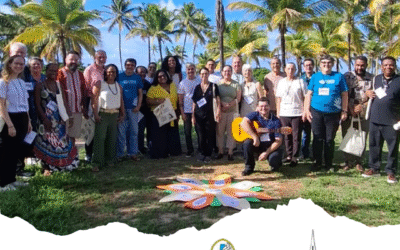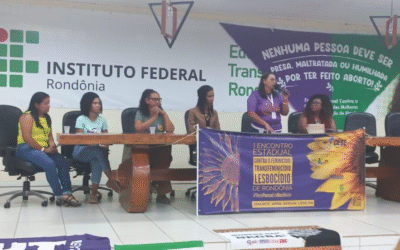CESE: Affirming Human Rights
CESE´S 52nd Annual Assembly
CESE held its 52nd Annual Assembly on June 12 and 13, in Salvador/BA. The activity was attended by the current Institutional Board, Fiscal Council, representatives of the Member Churches, and other invited organizations. Traditionally, during the Assembly period, CESE...
“Accessibility—So What?”: Roundtable Discusses Inclusion, Ableism, and the Struggles of Women with Disabilities”
On the afternoon of Wednesday, the 14th, women from various organizations participated in the virtual roundtable: “Accessibility—So What?”, promoted by CESE and the Brazilian Movement of Blind and Low Vision Women (MBMC), as part of the “Giving for Change” program....
The fight against femicide in the state where the most women are killed
In 2024, around 68 women - including black, indigenous, young, elderly, trans and disabled women, from both the countryside and the city - met in Rondônia with the same goal: to come up with strategies to tackle violence...
All News
A Brief History
The Ecumenical Coordination of Service (Coordenadoria Ecumênica de Serviço: CESE) is an ecumenical organization composed of six Christian churches, founded in 1973 as an expression of ecumenical commitment to the defence of human rights. From the beginning, its purpose has been the promotion, guidance, support and monitoring of ecumenical service activities, across the entire nation, but particularly in the North and Northeast. It foundation was based on guidelines that grew out of the Meeting for Consultation on North-Northeast Inter-Ecclesiastical Assistance in Brazil, which was held in Salvador, Bahia, in 1972.
It is currently composed of the following churches:

Evangelical Church of the Lutheran Confession in Brazil

Independent Presbyterian Church of Brazil

United Presbyterian Church of Brazil

Anglican Episcopal Church of Brazil

Roman Apostolic Catholic Church

Alliance of Baptists of Brazil
Created at the height of the military dictatorship CESE sought to offer a sign of hope by adopting an ecumenism of service aimed at the defence of rights, in other words a politicized service to meet the needs of the social movements and support effective measures to change the conditions of the most vulnerable, marginalized and excluded populations. Since then, CESE has asserted a new concept of diakonia, going beyond the welfare approach, tackling the causes of Brazil’s main social problems and positioning itself alongside the most vulnerable, seeking modes of organization, mobilization and education that transform reality.
For five decades, CESE has functioned as a point of convergence between the churches, sources of funding and grassroots movements. It has focused its activities on grassroots social movements and action expressed through various forms of organization: community cooperation; associations, cooperatives, and grassroots groups; churches, ecumenical and other faith-based organizations; local, regional and national social movements; networks, forums and other forms of networking. Priority organizations are those that identify with the ethical principles that guide CESE’s work, have a capacity for mobilization and for the construction of community alternatives and/or seek to intervene in public policy at various levels (from the local to the national), and demonstrate the potential to run coordinated activities.
CESE is also a point of convergence between those organizations that support and those that are supported, be these ecumenical and/or social movements, and always in the sense of caring for the common house, in defence of justice, democracy and for the construction of good living.
MISSION
To strengthen social movements, ecumenical and inter-religious movements, grassroots groups and other organizations involved in the struggle for the political, economic, social and environmental transformations that lead to structures in which democracy with justice prevails, from a Human Rights perspective and for the integrity of the common house.
PRINCIPLES
CESE’s activities are based on the following ethical principles:
- Commitment to democratic practices in general and to grassroots participation in particular;
- Commitment to honesty and transparency in the management of resources;
- The promotion of social relationships based on equity, without discrimination based on race, ethnicity, gender, sexual orientation, age, confession of faith or political opinion;
- Full respect for the physical and moral integrity of children and adolescents;
- Valuing diversity in religion and in inter-ecclesiastical and inter-religious dialogue;
- Commitment to socio-environmental issues in the defence of our common house for current and future generations.
INSTITUTIONAL AIMS
CESE’s permanent, long-term Institutional Aims are as follows:
- To strengthen grassroots social movements and organizations;
- To strengthen ecumenism and inter-religious dialogue and support for grassroots causes;
- To ensure its own institutional robustness and sustainability over time.
Given these Institutional Aims, over the next four years, CESE intends to become a benchmark in the field of ecumenical and inter-religious dialogue. In times of growing religious fundamentalism and within the struggle for rights, it is essential for CESE to represent a voice in favour of ecumenism on the national stage.
STRATEGIES FOR ACTION
CESE understands its strategies for action systemically. Support to projects; training activities; dialogue, networking and mobilizing support; and communication activities are therefore planned jointly, with each feeding back to the other, in order to fulfil our institutional mission to strengthen grassroots organizations, social movements and diaconal services.
On the one hand, we work to strengthen supported organizations through training projects; on the other, Dialogue and Networking activities are fundamental for ensuring close alignment between our institutional activities and the priorities of the organizations and social movements, so as to feed into our analyses and project monitoring, contributing to the detail of our training content, our methodology, and our planning to mobilize support.
Over this four year period, we will intensify our ecumenical activities in the Amazon to strengthen the resistance and fight for the rights of traditional peoples and communities, enhancing ecumenical and inter-religious dialogue against fundamentalism; help to set up and consolidate autonomously-organized funds with indigenous, quilombola and other local social movements and continue, in various ways, to strengthen the organizations of traditional peoples and communities that work for the defence of rights in the region.
Project support service
Training
Ecumenism and Inter-religious Dialogue
Dialogue and networking
Mobilizing support
Strategic communication
Project support service
CESE was a pioneer in prioritizing one-off support for small projects, favouring grassroots movements at strategic moments in their organization, enabling the community to govern the planning and execution of their own activities and motivating the search for autonomy. The same is true of the support provided to the churches’ diaconal activities.
The Small Projects Programme supports initiatives from grassroots rural and urban organizations, representatives of the various sectors that constitute Brazilian society, for example indigenous populations, quilombolas and other black populations, traditional communities, family farmers, the landless, those affected by large-scale projects, women, young people, etc.
Strategic communication
Communication is understood as strategic, to increase the visibility of the causes defended by the grassroots movements, reassert the importance of human rights and combat the growing criminalization of the grassroots movements, in counterpoint to the hegemonic media and networks. CESE seeks to raise awareness with its key audiences, the christian churches and other expressions of faith so that they commit to human rights, particularly in a context of growing religious fundamentalism. To this end, it hosts public events to give voice to perspectives from the social movements and is a member of communication collectives in order to enhance its relationship with grassroots communicators. We make pronouncements through public positioning, prepare and participate in campaigns, and produce content for our communication channels, shaped by the defence of rights
In addition to these methodological strategies, CESE is concerned with its own institutional robustness. This is partly focused on fundraising, to confront the growing challenge of financial, political and technical sustainability. We understand that fundraising is also a feature of our role in democratizing access to funding sources for local organizations, expanding opportunities for support, which is why we offer training in fundraising and encourage those from national and international cooperation to join our debates with the grassroots movements.
Regarding fundraising, in addition to our historical relationships with ecumenical cooperation agencies, ongoing dialogue with other funding sources (including domestic ones), and the pursuit of grant funding and new sources, CESE also works to develop campaigns and promote events, often in partnership with other organizations in the same field. All our fundraising activities are aimed at mobilizing people, resources and support for the diversification of sources, including individual donors and access to public funds based on grant funding and Law 13019/2014, which governs the Regulatory Framework for Civil Society Organizations (Marco Regulatório das Organizações da Sociedade Civil: MROSC).
Mobilizing support
This strategy confirms CESE’s position as an ecumenical organization for the defence of rights at national and international level. We seek to influence the public debate through activities that express this role, drawing society’s and the State’s attention to serious rights violations. Depending on the context, these activities are undertaken jointly, especially with the ecumenical movement, to involve as many social actors as possible, provide greater visibility and amplify effects.
Dialogue and networking
CESE coordinates and dialogues with social movements, churches, sources of funding and other support, as well as other organizations, in order to commit christian churches and other faith traditions to the cause of human rights from an ecumenical and inter-religious perspective and to better align with the grassroots movements’ agendas for struggle. This strategy comes about through participation in strategic networks and forums, and by promoting activities involving churches, sources of funding and other support, social movements and other partners.
CESE also supports Ecumenical Dialogue and Relationships. This strategy places an emphasis on the defence of the secular State, and is understood as an expression of CESE’s identity (particularly in response to the setbacks to ecumenical dialogue and relationships in Brazil), and commitment to the defence of rights. This includes activities such as campaigns, consultations, seminars, debates, workshops, contributions to publications and participation in the ecumenical movement’s national and international networking arenas in order to strengthen their approach to the defence of rights and to extend inter-religious dialogue.
Training
Training activities are guided by the ecumenical values of justice, peace and the integrity of creation, based on the theoretical framework of Liberation Theology – associated with developments in this theology regarding gender, race and ethnicity – and on the principles of Popular Education, such as shared dialogue and the political view of training as a pathway to strengthen the grassroots fight for social transformation.
CESE runs training to strengthen the capacities of grassroots organizations in their fight for rights. This training is provided in various formats, and focuses on a range of topics for a range of audiences from different regions, particularly on our priority regions (North, Northeast and Centre-West). Gender, race/ethnicity and social classes are structural features of our training processes. To this end, we have sought to improve activities in order to enhance political and technical quality; established a benchmark consultancy to monitor and guarantee alignment between methodology and topic; and defined indicators for a database that supports monitoring and alignment with the organization’s criteria to benefit priority audiences.
Ecumenism and Inter-religious Dialogue
CESE also works in Ecumenical Dialogue and Relationships. This strategy places an emphasis on the defence of the secular State, and is understood as an expression of CESE’s identity, particularly given the setbacks in Brazil to ecumenical dialogue and relationships and the country’s commitment to the defence of rights. Activities include campaigns, consultations, seminars, debates, workshops, contributions to publications and participation in the ecumenical movement’s national and international networking arenas, in order to strengthen their approach to the defence of rights and to extend inter-religious dialogue.
THE GROUPS CESE WORKS WITH
CESE works with those sectors of the population that suffer the impacts of inequality and organize to confront them through collectives, organizations and/or social movements. CESE’s target audience is the rural and urban population that directly experiences the consequences of Brazil’s extreme inequality, fighting in an organized manner for the assertion of individual and collective rights. This population contains diverse sectors and experiences discrimination and intolerance. This area is divided into our key audience and the organizations with which we construct priority alliances.
Beneficiary sectors
CESE’s principal beneficiary sectors include the landless; small-scale producers, including family farmers; extrativists, including rubber tappers, coconut breakers and artisan fishermen/women; agricultural labourers; the homeless, including street dwellers; residents of city peripheries; people with disabilities; the unemployed and informal urban workers, including waste recyclers; workers in the grassroots solidarity economy; populations affected by large-scale projects; and traditional populations that support themselves through a variety of land-use systems, such as faxinalenses, geraizeiros, riverside dwellers, vazanteiros, cipozeiros, and pasture and grazer communities.
Since CESE was founded by the churches to provide diaconal activities for the grassroots movements, its public beneficiaries include the diaconal services of the churches, and ecumenical organizations that work from the perspective and in the defence of rights. Given the country’s religious diversity, and paying particular attention to the growth of fundamentalist groups, CESE participates in, coordinates and supports activities and projects that help to strengthen inter-religious dialogue and respect for religious diversity. In this way, faith-based sectors, particularly those of African origin, and indigenous spiritualties that work in the defence of rights, also receive support from the organization. Ecumenism, inter-religious dialogue and the right to religious freedom are key elements of CESE’s work.
In all its activities and programmes, CESE considers the components of gender and race to be strategic and structural elements to strengthen democracy and for the equality of rights.
MAIN ALLIANCES
CESE’s priority alliances are with the grassroots social movements, associations, unions, grassroots groups, cooperatives, forums, networks and coalitions, non-governmental organizations that support and advise the grassroots movement, ecumenical organizations and the social action sectors of the churches. We seek to expand our relationships with groups or organizations that work in the area of digital rights, understanding that this topic needs to be publicised within the social movements to increase reflections about inequality of access, and the impact of control and surveillance policies, the use of data, the spread of fake news, and other issues that impact on both the movements and society in general.
Some examples of the priority alliances with which CESE works in the field of Dialogue and Networking include: the member groups and associations of the Campaign in Defence of the Cerrado (Campanha em Defesa do Cerrado); the National Commission of the Coalition of Black Rural Quilombola Communities (Comissão Nacional de Articulação das Comunidades Negras Rurais Quilombolas: CONAQ); the Brazilian Women’s Coalition (Articulação de Mulheres Brasileiras: AMB); the World March of Women; the Agroecology Coalition of the Amazon (Articulação de Agroecologia da Amazônia: ANA – Amazônia); the Semi-Arid Coalition (Articulação do Semiárido: ASA); the National Forum for Urban Reform (Fórum Nacional de Reforma Urbana: FNRU); the Zero Evictions Campaign (Campanha Despejo Zero); the Association of Indigenous Peoples of Brazil (Articulação dos Povos Indígenas do Brasil: APIB); the Coordination of Indigenous Organizations of the Brazilian Amazon (Coordenação das Organizações Indígenas da Amazônia Brasileira: COIAB); the Association of Indigenous Peoples of the Northeast, Minas Gerais and Espírito Santo (Articulação dos Povos Indígenas do Nordeste: APOINME); the Union of Indigenous Women of the Brazilian Amazon (União das Mulheres Indígenas da Amazônia Brasileira: UMIAB); the Movement of Indigenous Peoples of the Cerrado (Movimento dos Povos Indígenas do Cerrado: MOPIC); and various coalitions of black women, young people, rural workers, recycling waste material workers and other coalitions in the urban struggle. This includes the Brazilian Association of Non-Governmental Organizations (Associação Brasileira de ONGs: ABONG); the Networking and Dialogue Process (Processo de Articulação e Diálogo: PAD), and other Ecumenical Organizations and their counterparts in Brazil. These are only some examples of the social and collective subjects with which CESE maintains historical and political partnerships at various levels, and with which we will increase dialogue in order to fulfil our institutional aims.
Over recent years, our work in the Legal Amazon has expanded, by supporting projects and providing training to strengthen indigenous and quilombola organizations. Partnerships with COIAB and the Podáali Indigenous Fund (Fundo Indígena Podáali) have been a strategic factor in reinforcing the rights agenda of traditional peoples and communities. We have received calls from the Interstate Movement of Babassu Coconut Breakers (Movimento Interestadual das Quebradeiras de Coco Babaçu: MIQCB) to help strengthen the management of the Babaçu Fund (Fundo Babaçu). We also work in close partnership with the quilombola movement and its national coalition, CONAQ, which has mentioned the possibility of setting up its own fund. At CESE, we intend to use our experience to help develop this fund, as well as others we have discussed with traditional peoples and their community organizations.
In terms of dialogue and networking in the ecumenical field, CESE has built relationships through the ACT (Brazil) Ecumenical Forum (Fórum Ecumênico Brasil: FEACT), which brings together ecumenical organizations and churches to mobilize ecumenical support at national and international level. We are part of the ACT Alliance, which brings together ecumenical organizations at global level and where CESE and FEACT work on global issues related to human rights, development and emergencies. CESE also works with the National Council of Christian Churches of Brazil (Conselho Nacional de Igrejas Cristãs do Brasil: CONIC), which is composed of christian churches for the defence of rights from different regions in Brazil, and which is an important partner for approaching churches in the Amazon.
BENCHMARK POLICIES
CESE’s institutional and benchmark policies form part of its political and theoretical framework, which sets out our vision of the world and our commitment to pathways for social transformation. Since we are unable to address all social problems, at CESE we concentrate our efforts in line with our benchmark policies, which demonstrate our priorities for specific human rights, and our institutional policies, which form part of our human rights work and permeate all our work. We will review our institutional and benchmark policies over this four-year period.
There is a certain amount of interdependence and interdisciplinarity between CESE’s Benchmark Policies, which guide our entire institutional strategy. These seek dialogue with the current context, which is marked by setbacks to democracy and previously won rights; the dismantling of public policies; the reduction of arenas for grassroots participation and public oversight; the rise of conservative forces in the legislature; an increase in conflicts in both rural and urban areas, culminating in an increase in the imprisonment and murder of, as well as threats to, human rights defenders; and the criminalization of civil society movements and organizations, in particular of activists in the fight for land, quilombolas, the indigenous and women. A summary of CESE’s benchmark policies follows below.

Right to Land, Water and Territory
At CESE, we recognise the unequal distribution of land and water as core elements in power relations in Brazil and we have supported struggles in this field, taking account of all the diversity this has entailed, in both rural and urban environments, since CESE’s foundation. Some fundamental elements of this policy are: support for agrarian reform and the demarcation of indigenous and quilombola lands and those of other traditional communities, access to urban land and land regulation, the conservation of biodiversity, the guarantee of socio-environmental justice, encouraging strategies of access to water for consumption and production, the defence of agro-ecological peasant farming, and combatting agri- and water businesses, as well as large-scale infrastructure and mining projects.

Right to Identity in Diversity
At CESE, we understand that respecting diversity is a principle for achieving human dignity. We also see that gender, race and ethnicity, in connection with class, constitute the structural dimensions of social inequalities, given the historical formation of capitalism in Brazil, marked by colonialism, slavery and the patriarchy. We therefore seek to support the historically vulnerable sectors of Brazilian society, which organize according to collective identities in order to redefine their position in society and transform the social structures of oppression and exploitation, given their material and symbolic features. Other key elements of this policy include ecumenism, inter-religious dialogue and the right to religious freedom.
When we review this policy over the next four years, we will also look at addressing the identity debate.

Right to the City
CESE understands cities to be spaces of contradiction and dispute, given the imposition of a privatized model that exacerbates socio-spatial and racial segregation, based on alliances between the public authorities and market sectors. In line with the urban movements, CESE embraces a broad concept of the Right to the City, not only in the form of access to services, but also as the right to renovate and transform cities. In this sense, this policy includes rights related to the exercise of participation in the management of cities and their economic, social, cultural and environmental components, including the right to housing, public transport and urban mobility, accessibility, education, health and so forth.

Right to Work and Income
CESE recognizes the context of extreme social inequality, structural unemployment and the precarization of work relations within the neoliberal framework, which reflects a development model that ignores diverse ways of life and exacerbates ethnic-racial segregation and the subordination of women. We seek, through this policy, to help to guarantee the necessary conditions for the production and reproduction of life, strengthening resistance to the neoliberal model and stimulating the construction of alternatives means of production, commercialization and consumption, such as family and peasant farming, agro-ecology, the solidarity economy and the grassroots sectors, among others.
INSTITUTIONAL POLICIES
Institutional policies are CESE priorities that should permeate all its strategic activities in line with its benchmark policies. Here, gender, ethnic-racial and environmental dimensions are considered to be core elements, capable of linking the demands and propositions of those population sectors that have been made most vulnerable by the structures of domination and exploitation, with the strategic action undertaken in connection with our benchmark policies dealing with specific rights. Training and communications have been adopted as institutional policies, since they are viewed as practices that should feed into all the socio-political processes for grassroots organization and the demand for rights.
Gender equity
CESE recognizes the persistence of gender inequalities in Brazil, which are an obstacle to guaranteeing the human rights of women, particularly women from the grassroots sectors, and which have a more marked effect on black and indigenous women. We therefore understand gender equity to be a guiding ethical principle for all our activities, and challenge ourselves to adopt a gender perspective in both our internal relations and our relations with partners.
In seeking to reverse gender inequalities, we have constructed guidelines to direct our institutional practice in terms of management, ecumenical relations and inter-religious dialogue, communications, support to projects, dialogue and networking, and training. In our political and institutional activities, we adopt a feminist concept of the social relations of gender, understanding that these express inequalities of power between men and women, to the detriment of women and social groups with non-traditional gender identities and sexual orientations. In the area of theology, we seek to provide feedback on theological productions and the grassroots struggle, taking feminist hermeneutics and theology as one of our frames of reference, based on the affirmation of women’s dignity.
CESE’s approach to gender is composed of the following elements: 1) Recognition of women’s right to equality and dignity before God and all humanity; 2) The importance of feminist theology, encompassing the participation of women at all levels of the church; 3) Recognition of feminism in the construction of women’s fight for equality; 4) Understanding the powerful connection between the components of class, gender and race/ethnicity in the configuration of inequalities in Brazil; 5) Commitment to strengthening the grassroots women’s movement as an autonomous political subject; 6) Recognition of the importance of including women in management posts and project activities, without creating additional workloads or exploiting the unpaid workforce.
Socio-environmental Justice
We are finalizing our Socio-environmental Justice Policy, which will take effect over this four-year period and guide the organization’s internal and external activities. It will ensure this issue is incorporated into our educational, dialogue and networking, and communications activities. We will ensure this is not restricted to work in biomes or climate issues.
Training
CESE’s educational activities are informed by three sources: its own history; the ecumenical perspective; and Popular Education in its interface with the various work areas that have been developed over recent years in the grassroots movements in Brazil. Through its Training Policy, the institution seeks to respond to the training needs of the grassroots movements, in the light of the current political situation with the fragmentation of democracy and the grassroots. Training activities also provide an opportunity for greater approximation between CESE’s team and the groups and movements it supports, enhancing the team’s capacity to analyse their situation and the context in which they work.
Training activities are guided by the ecumenical values of justice, peace and the integrity of creation, aimed at respect for the autonomy of grassroots groups and movements and their strategies, rejecting any form of doctrinalism. From this perspective, wherever possible, the institution’s educational activities must take account of structure, context and the political situation. Here, we apply the theoretical framework of Liberation Theology, associated with its characteristic critique of economic developmentalism, and integrating the developments made in this theology regarding gender, race and ethnicity. This policy also takes note of certain training organization and funding features, separated into: the organization of work themes and priority audiences; the way training activities and processes are run; self-training; the internal organizational structure; training funding; and recommendations.
Over this four-year period, at institutional level, we will seek to expand CESE’s educational activities, compiling data and exchanging methodologies. One commitment is to strengthen our methodology, our way of doing, based on greater integration between body and mind, in dialogue with the notion of collective care.
Racial Equity
CESE identifies and recognizes the existence of individual, institutional and structural racism within the historic construction of the State and Brazilian society, and that this racism gives rise to injustice for the black population. The components of class, race and gender are pillars of the profound inequalities in Brazil and the foundations of racism in society. Violence against black people, particularly women, the genocide of black youth, mass incarceration, and discrimination against Afro-Brazilian religions represent only some of the appalling expressions of Brazilian racism. Through its Institutional Racial Equity Policy, CESE publically reasserts its commitment to the anti-racist struggle by drafting strategies to overcome racism in management, ecumenical relations and inter-religious dialogue, communications, support to projects, dialogue and networking, and training. We seek to overcome racism and advance the promotion of justice and the guarantee of the rights of the black population, who constitute the majority of the Brazilian population.
This policy is based on CESE’s mission and one of its ethical principles: “Equity without discrimination of race, ethnicity, gender, sexual orientation or religious creed”. For these assumptions to be effectively guaranteed, our concept of racial equity is composed of the following elements: 1) Adopting the presumption of intersectionality between the aspects of class, gender and race/ethnicity in the structure of inequalities in Brazil; 2) Recognition of and valuing self-organization and the struggles of black movements and organizations, particularly those of black women; 3) Valuing religious diversity by combatting religious racism, promoting respect and valuing African-origin religions; 4) The expansion, alongside the christian churches, of knowledge about and experiences of Black Theology, in order to deconstruct the majority white, American and European, theology.
CESE’s racial equity policy will be expanded to include ethnicity and/or we will draft a policy aimed at the difficulties faced by indigenous people.
Communications
Communications are seen as strategic in raising the profile of the causes defended by the grassroots movement, reasserting the importance of human rights and confronting the growing criminalization of the grassroots movements, in counterpoint to the hegemonic media and networks. At CESE, we intend to raise awareness with our audiences, the christian churches and other expressions of faith so that they commit to human rights, particularly in a context of growing religious fundamentalism. To this end, we host public events to give voice to the perspectives of the social movements and have joined communications collectives to enhance our relationships with grassroots communicators. We make pronouncements through public positioning, draft and participate in campaigns, and produce content for our communication channels to promote the defence of rights.
Data Protection Policy
CESE understands that the right to privacy is a Human Right, as stipulated in item 10, article 5 of the Federal Constitution, which is closely related to the Universal Declaration of Human Rights (Art 12). The organization already has an Information Security Policy, which we have expanded to create a Data Protection and Privacy Policy, in line with Brazil’s General Data Protection Law (Lei Geral de Proteção de Dados: LGPD). This policy aims to provide instructions so that decisions about the organization’s information and communications security, and its management are made in line with principles and processes that ensure our activities are consistent, effective and credible. The policy aims to address all areas of information produced and administered by the organization. A series of commitments have been established, related to various situations in order to protect the integrity and security of the organization, the team and members of our community.
Depoimentos

Small Projects Programme
Since its foundation in 1973, support to small projects has been one of CESE’s principal strategies for fulfilling its mission. At the time, Brazil was going through one of the darkest periods of its history; the military dictatorship, which took over in 1964, had interrupted the democratic process, curtailing civil liberties and aggravating existing inequalities.
In this context, CESE’s decision to strengthen grassroots struggles by encouraging and supporting small projects around Brazil, demonstrated its recognition of the capacity of organized groups to directly manage resources for their initiatives in the defence of rights and democracy.
Almost 50 years later, this strategy operates through CESE’s Small Projects Programme, which continues to support projects around Brazil, while prioritizing three regions (Northeast, North and Central-West). The programme’s numbers can be seen below:
Click here (in Portuguese) to find out more about how the Small Projects Programme works, the criteria for sending in a proposal, its priorities, types of projects and other relevant information.
Within the Small Projects Programme, CESE also supports emergency and humanitarian aid. To find out more, click on the link below (in Portuguese)
+ CESE AND EMERGENCY SITUATIONS
In addition to this information about support for projects, we have a section for FAQ, which can be accessed below (in Portuguese):
PRESS OFFICE
CESE’s Communications Team is composed of the following:

Patrícia Gordano
Publicity and Public Relations – Communications Coordinator

Marília Pinto
Public Relations – Communications Analyst

Tarcilo Santana
Journalist – Communications Analyst

Beatriz Tuxá
Cultural Producer – Communications Analyst
If you are a journalist and would like to receive news about CESE or request information for a story, please contact us via e-mail at: cesedireitos@cese.org.br or by telephone: 55 (71) 21045454 / 55 (71) 999787846 WhatsApp
Follow us on social media (@cesedireitos) to stay up to date about everything that’s happening at CESE!





























